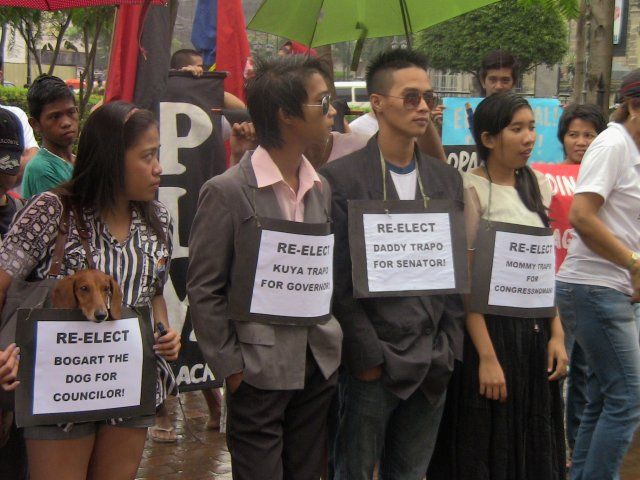
At a one-day assembly of more than 500 delegates on November 28, the militant socialist Party of the Labouring Masses (PLM) introduced its candidates for national elections scheduled for May 13 next year.
The PLM, which now holds positions in several Barangay (neighbourhood) councils, is running 20 candidates for municipal councillor, vice-mayor, mayor and Congress. They include candidates in Negros and Iligan, in the Philippine archipelago’s south. Most candidates, however, are in Metro Manila or the semi-urban provinces surrounding the capital: Cavite, Rizal, Bulacan and Laguna.
This area, home to more than a third of the country’s population, is where the party has its strongest base.
Along with the PLM candidates, the assembly was also addressed by Dick Penson, a businessperson running for the Senate.
A successful entrepreneur may seem an unlikely guest at an assembly of a radical left-wing party whose main base is in the urban poor. But as another guest speaker – Australian Socialist Alliance member and former Green Left Weekly Caracas correspondent Federico Fuentes – explained, a feature of neoliberal imperialism is that in many poor countries every aspect of the economy is monopolised by foreign multinationals.
Political power becomes concentrated in an ever-shrinking elite, marginalising national business in the process.
In the Philippines, this has reached the point of absurdity, with political power monopolised by 119 families, less than 0.0005% of the population. These dynasties use political office to enrich themselves, generally through legally suspect means such as awarding themselves land. As their wealth is dependent on holding office, they invest in getting family members elected.
Penson is running on the Krusada Kontra Dynasty (Anti-Dynasty Crusade) ticket, while the PLM is making tackling the political dynasties the focus of its campaign. There are plans for both to join on a “caravan against the dynasties” that will travel the country early next year.
PLM national chairperson Sonny Melencio, in his address to the assembly, explained the history of the dynasties. The most established can trace their power to their ancestors collaborating with the Spanish, who ruled the Philippines from the 1500s until 1898.
The Filipino revolution against the Spanish was crushed by the US who established their own rule. New collaborators came forward, creating new dynasties.
When Japan occupied the Philippines during World War II, most of this elite departed with the US occupation forces. This was an opportunity for others to collaborate with the Japanese and found their own dynasties.
The 119 families who rule the Philippines come from all these generations of collaborators. They also feature a few newer dynasties established through holding political office in the neocolonial independent republic established in 1946.
In a country with no social security and few opportunities for regular employment, one way the dynasties stay in office is through the distribution of meagre “gifts” to their electorates.
They also use more sinister means. Particularly in rural areas, political clans keep private armies. Elections in the Philippines can be violent affairs.
After the 1986 uprising that overthrew the US-backed Marcos dictatorship, some anti-dynasty measures were introduced. Article 2, Section 26 of the constitution states: “The State shall guarantee equal access to opportunities for public service, and prohibit political dynasties as defined by law.”
However, laws to make this constitutional provision reality are unlikely to come while legislators are themselves members of the dynasties.
Another measure is the reservation of 57 of the 287 seats in Congress to Party Lists representing marginalised constituencies. The Commission on Elections (Comelec) is supposed to ensure that Party List candidates are from non-elite backgrounds.
This has not stopped the dynasties from establishing Party Lists with their family members as candidates. These are popularly known as “BoPals”, short for “bogus Party Lists”.
On October 25, the PLM Youth held an anti-BoPal protest at the Comelec offices, with street theatre featuring the “Trapo family” running various members for elected office, including the family dog. Trapo is a pejorative term for traditional politicians.
Fuentes’ presentation on the revolutions in Venezuela, Bolivia and Ecuador generated much discussion, particularly as the working class in these countries is – like the Philippines – comprised mainly of people in the informal sector.
Before the Asian financial crisis in 1998, the PLM-aligned trade union federation, the BMP, was made up mainly of industrial workers. Since then, this sector has shrunk dramatically due to jobs being exported to Cambodia and China. The BMP's work has increasingly been through its affiliates, KPML and PMT, organising the urban poor: motorcycle-taxi drivers, street vendors, contractualised call-centre workers, the underemployed and the unemployed.
As urban poor communities are often next to rivers and creeks and are flooded with increasing regularity, climate justice has become an important issue for the PLM.
The Philippines’ role in the globalised capitalist economy is predominantly as an exporter of labour. This has a devastating effect on society as families are torn apart. Filipino children are commonly brought up by grandparents. The abuse suffered by overseas Filipino workers, particularly female domestic workers, is infamous.
Apart from the issue of political dynasties, Penson has said that export of labour is the main issue on which he will campaign. He noted that from the glitzy buildings of Dubai to the mines of outback Australia and US hospitals, the world is kept running by Filipino labour while the Philippines stagnates.
PLM candidates include Uriel Jojo Borja, running for Congress in Iligan, Bong Sevilla, running for mayor of General Mariano Alvarez municipality, Cavite, where the PLM is running a full slate of eight councillor candidates, and Restituto Mendoza running for vice-mayor of San Pablo City.
Dominic Flores, running for councillor in Quezon City, is making history as an openly gay candidate. In Barangay Pansol, whose council he heads, he established a gender equality office and anti-discrimination ordinances. He has pledged to replicate this in the Quezon City municipal council if elected.
[Tony Iltis as a member of the Australian Socialist Alliance who attended the PLM's one-day assembly.]
